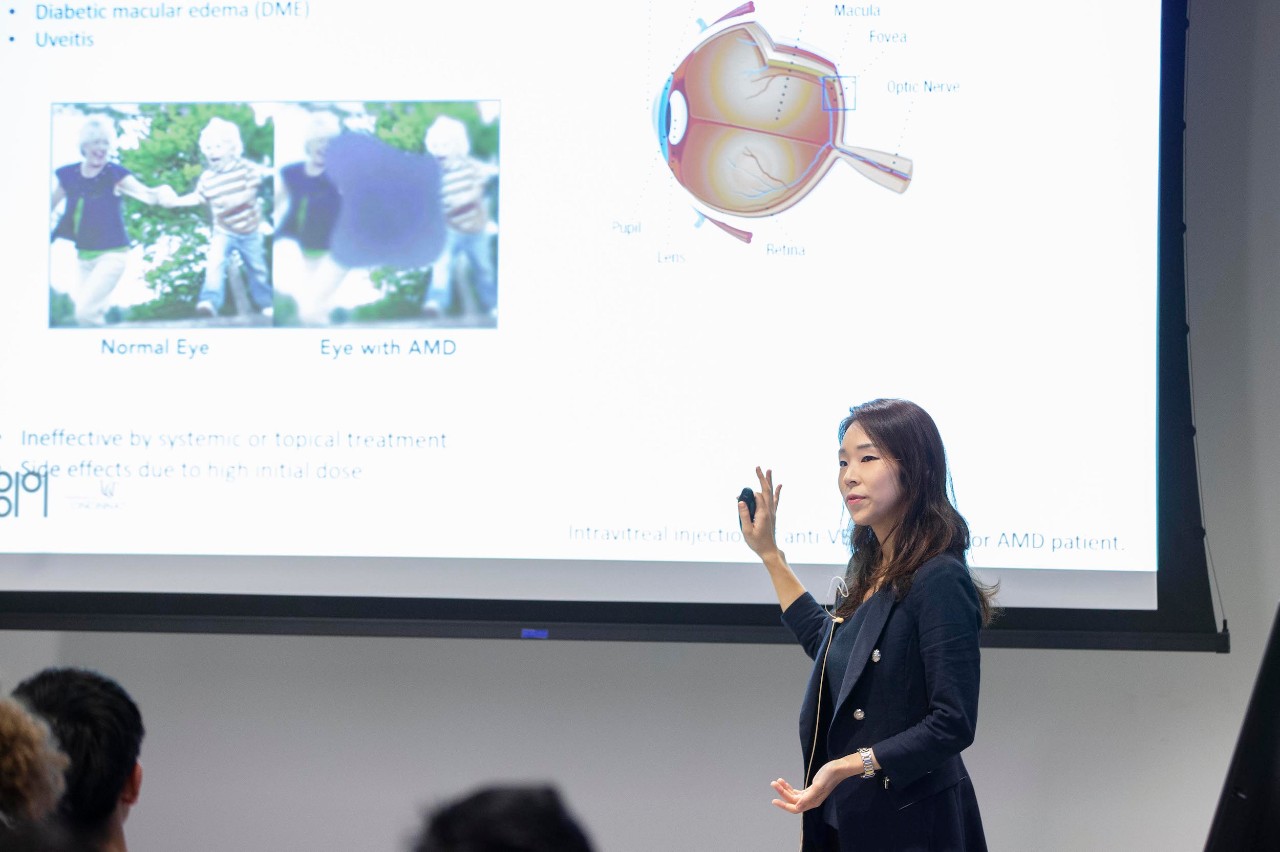
Venture Lab starts up second year strong
The University of Cincinnati’s pre-accelerator program is set to break its own record for startups
After it catalyzed a record-setting uptick in the number of startups spun out of University of Cincinnati intellectual property in its first year, the UC Venture Lab pre-accelerator at the 1819 Innovation Hub appears to be on pace to raise the bar in Year 2.
Venture Lab has already awarded $1 million in funding and launched three startups since the beginning of UC’s new fiscal year on July 1. Director of Startups Grant Hoffman announced the news Tuesday at the graduation of Venture Lab’s sixth cohort.

Director of Startups Grant Hoffman, center, listens as the Hot Hooves team presents their business idea. Photo/Joseph Fuqua II/UC Creative Services
A total of 10 companies graduated from Venture Lab on Tuesday. Some of the businesses were faculty-owned, but student-, alumni- and staff-founded startups were all represented in this class.
Applications are for the Venture Lab’s seventh cohort will be accepted through Sept. 22. That cohort’s first class is Oct. 8, and graduation will be held Nov. 19. To apply, email Hoffman at grant.hoffman@uc.edu.
Graduating today:
Bigfoot — An AI-powered mobile application for restaurant owners and managers. Bigfoot alerts, reports and recommendations help them make better decisions that improve the experiences of their guests while optimizing how much they spend on labor.
LiFonSkin (Living Factories on Skin) — Microbial sunscreen. Genetically engineered mycosporine-like amino acids (MAAs) with potent ultraviolet-A (UV-A) and UV-B absorbing properties.
Permaculture Certification — Regenerative farming certification.
Biodegradable On-Demand Drug Delivery for Implant — Control dosage after you inject an implant in the body using a laser to effectively treat diseases of the eyes depending on progress and to reduce side effects caused by uncontrollable dosage or frequent injections.
Hot Hooves — Miniature die-cast horses that are cool, collectible, colorful, compact, active, adorable and affordable. The perfect complement to Hot Wheels for those who like unicorns and horses better than cars.
RNA Nanotherapy for Advanced Breast Cancer Cure — Highly innovative and nontoxic multifunctional RNA nanoparticles to overcome breast cancer treatment resistance.
Kodiak Design — A one-handed video game controller compatible with XBox, PlayStation and PC games for disabled gamers.
AnimaTICK — Pre-production software subscription as a service for independent filmmakers.
TadPol — Develops “pattern of life” for a specific target based on social media data, predicting physical activity, location and personality.
Virtual Counselor — Software program that helps people explore, in a safe virtual environment, the nature of their beliefs as they relate to their problem behavior.
Featured image: Yoonjee Park, assistant professor of chemical and environmental engineering, presents her team's business idea for a biodegradable ocular implant for on-demand drug delivery. Photo/Joseph Fuqua II/UC Creative Services
Innovation Lives Here
The University of Cincinnati is classified as a Research 1 institution by the Carnegie Commission, is ranked in the National Science Foundation's Top-35 public research universities and secured a spot on Reuter’s World’s Most Innovative Universities list. UC's students and faculty investigate problems and innovate solutions with real-world impact. Next Lives Here.
Related Stories
CCM Philharmonia presents concert + livestream on Feb. 20
February 18, 2026
Audiences can enjoy CCM Philharmonia's next concert in person or watch at home via livesteam at 7:30 p.m. on Friday, Feb. 20. Featuring alumni guest artists Rebecca Barnes, viola; and Jonathan Lee, cello; tickets for the "Midlife Crisis" concert are on sale now through the CCM Box Office. The livesteam is free to watch on CCM's website and YouTube channel.
Jes Cornelius appointed UC Foundation Vice President of Information and Enterprise Risk
February 17, 2026
The University of Cincinnati Foundation is pleased to announce that Jes Cornelius is its new Vice President of Information and Enterprise Risk. Cornelius has a comprehensive background leading enterprise wide technology transformation, strengthening digital strategy and driving operational excellence across complex, large scale organizations.
Designing Access
February 17, 2026
Faculty-led collaboration brings typography, wayfinding and public input to transit infrastructure.
